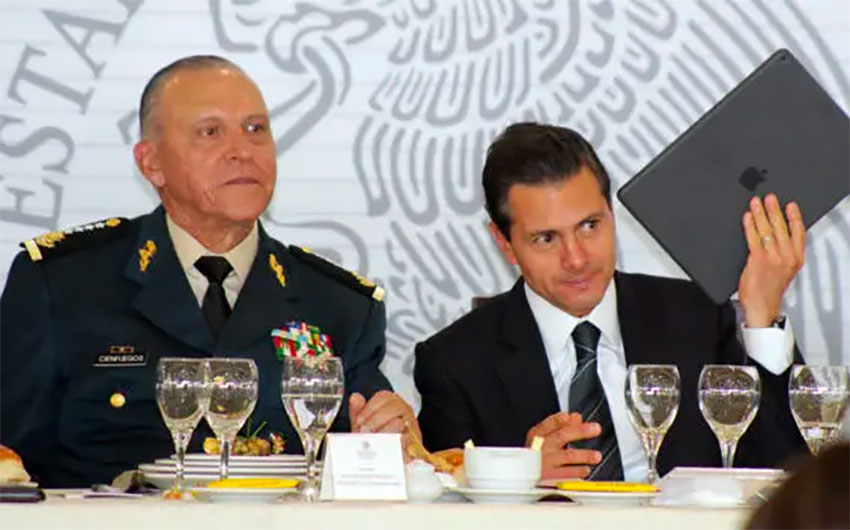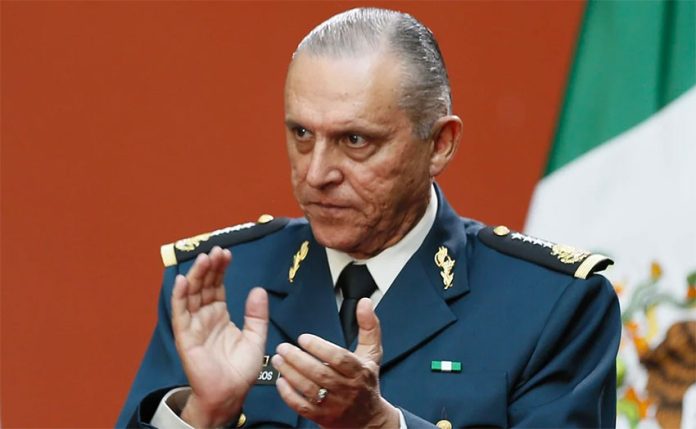A month after former defense minister Salvador Cienfuegos was arrested on drug trafficking and money laundering charges, United States and Mexican authorities announced Tuesday that the U.S. Justice Department was seeking dismissal of the charges so that the ex-army chief could be investigated in Mexico.
A federal judge in New York agreed to the request to drop the charges on Wednesday morning, saying there was no evidence or suspicion that Mexico won’t conduct an investigation into Cienfuegos’ alleged crimes.
Announced in a joint statement by United States Attorney General William Bar and his Mexican counterpart Alejandro Gertz Manero, the decision to release Cienfuegos, defense minister in the 2012-2018 government led by former president Enrique Peña Nieto, is both extraordinary and unexpected given that U.S. authorities spent years building a case against the ex-military official and have previously shown little faith in the Mexican justice system.
“In recognition of the strong law enforcement partnership between Mexico and the United States, and in the interests of demonstrating our united front against all forms of criminality, the U.S. Department of Justice has made the decision to seek dismissal of the U.S. criminal charges against former [minister] Cienfuegos, so that he may be investigated and, if appropriate, charged, under Mexican law,” Barr and Gertz Manero said in the statement.
They also said that the U.S. Justice Department has provided evidence in the case to Mexico and “commits to continued cooperation … to support the investigation by Mexican authorities.”
The statement noted that the Mexican Attorney General’s Office (FGR) opened its own investigation after learning of the charges against Cienfuegos but the Mexican government has not committed to trying the former defense minister even though U.S. prosecutors say that the evidence against him is “strong.”
Foreign Minister Marcelo Ebrard told a press conference Tuesday that Cienfuegos would be returned to Mexico “as a Mexican citizen” and will not be facing any criminal charges. He stressed that the agreement allowing the the 72-year-old former army chief to be investigated in Mexico was not representative of impunity but rather “respect for Mexico and its armed forces.”
Ebrard said it will ultimately be up to the FGR to determine whether Cienfuegos will face trial. He said late last month that Mexico had expressed its “profound discontent” to the United States over not being informed about the plan to arrest the ex-official, and the federal government lobbied the United States to allow him to face justice here.
According to the U.S. indictment, Cienfuegos as defense minister helped the H-2 Cartel, a splinter group of the Beltrán Leyva cartel, operate in Mexico and ship drugs to the United States, and conspired to launder the money he obtained from his involvement in the illicit activities. The case against him was largely based on thousands of incriminating Blackberry smartphone messages intercepted by United States authorities.
Cienfuegos pleaded not guilty to the charges earlier this month.
The decision to release the former army chief and allow him to return to Mexico “appeared to be an attempt to repair a growing breach in relations over Cienfuegos’s arrest,” The Washington Post said.

The arrest of the former defense minister was deeply embarrassing for the Mexican government, which holds the military up as one of the country’s most trustworthy institutions. It upset a bilateral relationship that has been punctuated with episodes of acrimony since United States President Donald Trump took office in early 2017.
President López Obrador, who is relying on the military for a wide range of tasks including public security and infrastructure construction, suggested that Cienfuegos might have been arrested “for political or other reasons” and accused the U.S. Drug Enforcement Administration (DEA) of “meddling” in Mexico’s affairs.
The Post reported that prosecutors in the U.S. attorney’s office for the Eastern District of New York attributed the decision to drop charges against Cienfuegos to the Mexican government’s threats to limit the role of the DEA in Mexico. The newspaper said that information came from a law enforcement official familiar with the case, adding that a Mexico official confirmed that the DEA could be barred from entering Mexico.
For their part, Barr and Gertz Manero said the United States and Mexico remain committed to “bilateral law enforcement cooperation.”
“As the decision today reflects, we are stronger when we work together and respect the sovereignty of our nations and their institutions. This close partnership increases the security of the citizens of both our countries.”
Alejandro Hope, a prominent Mexican security analyst, said that if the United States hadn’t agreed to drop the case against Cienfuegos, “the army would have held off on any kind of cooperation with the U.S. for a decade.”
Mike Vigil, a former DEA chief of international operations, said that the U.S. decision “is nothing more than a gift, a huge gift” from Trump to López Obrador. The two men have developed a warm relationship despite their ideological differences and the former’s history of aggressive and offensive rhetoric toward Mexico.
Vigil also said that “the chances of Cienfuegos being convicted in Mexico are slim to none,” adding that the U.S. decision “sends a very negative message to U.S. law enforcement agencies – that Donald Trump is willing to politically manipulate judicial proceedings.”
The decision represents a radical change of direction given that the United States government has sought to extradite Mexican drug traffickers and try them in its own courtrooms for decades because it believed that they would never be brought to justice in Mexico.
But the Trump administration is apparently willing to put that belief to one side in order not to upset the Mexican government – another radical shift given that the U.S. president is not known for his amiability toward Mexico.
In a filing asking a judge to dismiss the charges against Cienfuegos, U.S. prosecutors acknowledged that the Trump administration had come to the conclusion that preserving the relationship with Mexico was more important than pursuing the case.
“The United States has determined that sensitive and important foreign policy considerations outweigh the government’s interest in pursuing the prosecution of the defendant, under the totality of the circumstances, and therefore require dismissal of the case,” they wrote.
Ebrard rejected any suggestion that the United States’ actions were related to López Obrador’s decision not to congratulate Joe Biden on his election victory over Trump.
At his news conference on Wednesday morning, López Obrador asserted that there would be no impunity in the Cienfuegos case. He also said that Mexico had not committed to giving anything to the U.S. in exchange for it dropping the charges.
“There’s no exchange, we don’t establish commitments that affect our principles. … It doesn’t mean impunity, … an investigation has started, it started when they sent us the evidence,” López Obrador said.
He said the government expressed its anger to the United States about not being informed about the plan to arrest Cienfuegos because the U.S. violated a years-old agreement to provide such information.
The managing editor of InSight Crime, a foundation dedicated to the study of organized crime in Latin America, expressed doubt that Cienfuegos would be tried in a civilian court.
“[AMLO’s] prosecutors are going to have to weigh up what the evidence against Cienfuegos is and whether it is strong enough to warrant a very public trial, against the loyalty of the army and how much he wants to keep the army onside,” Chris Dalby said.
“Cienfuegos has a lot of friends in high places.”
It is also likely that Mexican courts will be unable to try Cienfuegos on much of the evidence collected by U.S. authorities.
The interception of the former defense minister’s telephone communications was not authorized by a Mexican judge and therefore the incriminating Blackberry messages were illegally obtained and will be inadmissible in court, wrote Carlos Marín, a columnist with the newspaper Milenio.
He also said the government could legally detain Cienfuegos in a military prison or place him under house arrest for up to 40 days while an investigation takes place. However, it appears more likely that he will be not be arrested upon arrival in Mexico.
The “possibility that Cienfuegos will remain free, at least for some time,” said The Washington Post, is “a symbol to some of the Mexican government’s ability to play hardball with the United States — and win.”
Source: The Washington Post (en), Milenio (sp), El Universal (sp), The Guardian (en)
